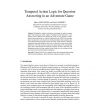Free Online Productivity Tools
i2Speak
i2Symbol
i2OCR
iTex2Img
iWeb2Print
iWeb2Shot
i2Type
iPdf2Split
iPdf2Merge
i2Bopomofo
i2Arabic
i2Style
i2Image
i2PDF
iLatex2Rtf
Sci2ools
AGI
2008
2008
Temporal Action Logic for Question Answering in an Adventure Game
Inhabiting the complex and dynamic environments of modern computer games with autonomous agents capable of intelligent timely behaviour is a significant research challenge. We illustrate this using our own attempts to build a practical agent architecture on a logicist foundation. In the ANDI-Land adventure game concept players solve puzzles by eliciting information from computer characters through natural language question answering. While numerous challenges immediately presented themselves, they took on a form of concrete and accessible problems to solve, and we present some of our initial solutions. We conclude that games, due to their demand for human-like computer characters with robust and independent operation in large simulated worlds, might serve as excellent test beds for research towards artificial general intelligence. Keywords. Temporal Action Logic, computer games, natural language understanding, artificial general intelligence, natural deduction, planning, epistemic reas...
AGI 2008 | Artificial General Intelligence | Artificial Intelligence | Intelligent Timely Behaviour | Natural Language |
| Added | 29 Oct 2010 |
| Updated | 29 Oct 2010 |
| Type | Conference |
| Year | 2008 |
| Where | AGI |
| Authors | Martin Magnusson, Patrick Doherty |
Comments (0)

